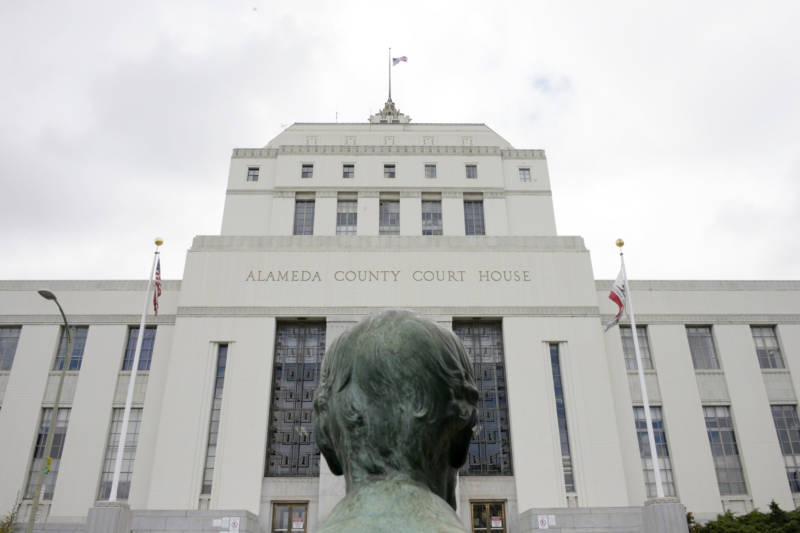The judge in the trial of two men facing manslaughter charges stemming from the deadly 2016 "Ghost Ship" warehouse blaze in Oakland heard arguments Wednesday over terminology that will be allowed in the case, including a defense request to limit the use of words such as “fire trap” and “tinderbox.”
Ghost Ship Trial: Arguments Over Metaphors, Anti-Semitic Jokes, Jury Site Visit

A warehouse illegally converted into a living and event space caught fire on Dec. 2, 2016, during an electronic music party. The fire killed 35 concert-goers and one resident in what was the deadliest structure fire in the U.S. in over a decade.
Master tenant Derick Almena and resident Max Harris each face 36 counts of involuntary manslaughter.
Harris' attorney Curtis Briggs argued Wednesday that the words “tinderbox,” "death trap,” "fire trap" and “maze” are terms that experts wouldn't use.
“There’s so much momentum for lay witnesses to say such terms after the fact,” Briggs said.
Almena's attorney Tony Serra said the metaphors were argumentative and could unfairly sway a jury against his client.
Alameda County prosecutor Casey Bates said the words are important because they referred to the physical condition of the warehouse — jam-packed with RVs, other makeshift living spaces, art projects and wood — and shouldn’t be limited during trial.
Judge Trina Thompson placed limitations on the use of the metaphorical language during opening statements, which are expected at the end of April.
But Thompson said the terms would be allowed otherwise because the “phraseology is common among lay persons."
The ruling mirrors Thompson's decision Tuesday against the defense’s use of the words “cover-up” and “scapegoat" to refer to Almena and Harris.
The defense argues other parties, such as the building's owner, should have faced charges instead of Almena and Harris. Defense attorneys also point to a series of apparent failures by Oakland fire, police and building inspectors, among other government officials, who could have intervened to shut the place down or bring it up to code.
Serra also argued in a motion to prevent mention of reference in a New York Times Magazine interview with residents of the Ghost Ship that claimed Almena spoke of Harris as "his Jewish slave," which Harris claimed was a joke.
Judge Thompson said the statement was already out in the public and was "quite inflammatory." She said she would look into the article and the motion will be taken up again next week.
Serra defended his client, saying Almena was not anti-Semitic. But Bates argued the statement showed relevant "positions of power, dominance and control over Harris."
Briggs also argued Wednesday for a motion to have the jury visit the site of the Ghost Ship. He said it would be useful for jurors to see why 36 people didn't make it out alive.
Bates argued the visit would be more confusing than helpful because conditions at the warehouse have changed. He said a visit to the site would raise safety issues and argued the jury will have access to thousands of photos of the burned-out building.
Serra broke from Briggs and sided with the prosecution on this motion saying, "from my perspective, this does nothing other than to add to speculation and confusion."
Thompson said the issue would be taken up again next week, but cautioned that any visit by the jury would have to be strictly controlled and would take several weeks to plan.
Serra also pushed to limit reference to Almena's alleged profits from managing the Ghost Ship, a request Thompson granted, but she plans to allow discussion of subleases at the warehouse.
Serra said Almena was not profiteering as master tenant of the warehouse and it was not relevant to the case. "We're not here for accounting," Serra said.
Bates called profiteering "absolutely relevant" to the case. He said "the procurement of the warehouse was to make money." He added that "in the warehouse he [Almena] was top dog."
Brian Getz, another attorney for Almena, argued for limits on demonstrations, signs, buttons and T-shirts with images of victims in the court room that could influence jurors. Thompson granted the motion, saying the court could limit activities that are disruptive. She said such displays could be considered intimidating.
Thompson said Tuesday she anticipated opening statements in the trial would begin on April 30. Testimony is expected to begin May 6. The trial could last for months and involve more than 200 witnesses. Selecting a jury will likely take most of April.
A gag order went into effect on Jan. 18 that bans the attorneys and defendants from speaking to the public, and won’t be lifted until at least the last juror is sworn in.